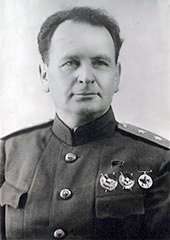Maksim Antoniuk

Maksim Antanavich Antoniuk (Belarusian: Максім Антонавіч Антанюк, Russian: Антонюк, Максим Антонович; 19 October 1895 – 30 July 1961) was a Belarusian military general and a politician.
Early life, World War I, and the Russian Civil War
He was born in a village in the area Macy, near Pruzhany District in Brest, Belarus.
In 1915 he was appointed to the Russian army, where he graduated from the Moscow School of Warrant Officers 3. He took part in World War I on the Northern Front. The war ended as a lieutenant.
In 1917 he joined the Red Guard, and in 1918 to the Red Army. During the Civil War in Russia he held the following positions: head of the department of topographical, deputy commander and commander of the combat sector, a representative of the Military Revolutionary Council, the commander of the regiment brigades.
Interwar period
In 1921 he graduated from the Military Academy them. Frunze and again the same Academy in 1925. In the years 1924 - 1930 he was successively commander of the 4 Turkiestańskiej Arms Division, Division 5 of Vitebsk Arms them. Czechoslovak Proletariat and 3 Crimean Arms Division. In the period from October 1930 to February 1931 he was a lecturer at the Military Academy. Frunze, then the commander and commissar 8 Corps Strzelecki.
In June 1937 he was commander of the Siberian Military District. In June 1938 years by the NKVD arrested on charges of treason in December 1938 years he rehabilitated and released. He was then a senior lecturer in tactics Military Academy. Frunze, then inspector of the infantry of the Red Army. On 2 August 1940 he was deputy inspector general of infantry of the Red Army.
World War II
After the German attack on the Soviet Union dealt with the formation of infantry divisions and the creation of battalions marching to supplement struggling division.
In August 1941 he was commander of Petrozawodzkiej Forces Group 7 Army and 48 Army of the Leningrad Front, fighting on the approaches to Leningrad, until its dissolution on 14 September 1941 year. Then he was commander of the 54 Army troops on the
In the period from October 1941 to June 1942 he remained unassigned at the disposal of the commander of the Leningrad Front.
In June 1942 he was commander of the 60 Army built upon the 3rd Army Reserve. Since September 1942, the deputy and then commander of the 2nd Army Reserve odwodu the Supreme Command of the Red Army. In April 1943, he was deputy commander of the Steppe Military District and the transformation of the circle in the Steppe Front deputy commander of the front.
Since October 1943 years the deputy commander of the Baltic Sea Front, then 2 Front Baltic Sea, a position he held until the end of the war.
Later life
After the end of World War II in the period from October 1945 to May 1947 years the deputy commander for. Training - Lviv Military District.
In 1947 he transferred to the reserve. He died in Moscow and was buried at Novodevichy Cemetery.[1]
Promotion
- Komkor (20 November 1935)
- Lieutenant General (4 June 1940)
Awards
Antoniuk received the following awards:
- Order of Lenin[2]
- Order of the Red Banner (three times)
- Order of Suvorov kl. II (04/06/1945)
- Order of the Patriotic War class. I (08.27.1943)
Bibliography
- Praca zbiorowa: Великая Отечественная. Командармы. Военный биографический словарь. Moskwa: Кучково поле, 2005, s. 14-15. ISBN 5-86090-113-5. (ros.)
- Praca zbiorowa: Командный и начальствующий состав Красной Армии в 1940-1941 гг. Структура и кадры центрального аппарата H КО СССР, военных округов и общевойсковых армий. Документы и материалы.. Moskwa: 2005, s. 89, 112. ISBN 5-94381-137-0.